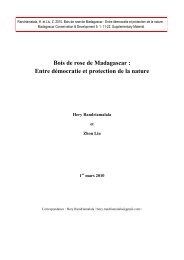Journal Madagascar Conservation - Madagascar Wildlife ...
Journal Madagascar Conservation - Madagascar Wildlife ...
Journal Madagascar Conservation - Madagascar Wildlife ...
Create successful ePaper yourself
Turn your PDF publications into a flip-book with our unique Google optimized e-Paper software.
MADAGASCAR CONSERVATION & DEVELOPMENT VOLUME 3 | ISSUE 1 — DECEMBER 2008 PAGE 64<br />
Radio broadcasting for sustainable development in<br />
southern <strong>Madagascar</strong><br />
Patrick O. Waeber I and Yvonne Orengo II<br />
ABSTRACT<br />
The Millennium Development Goals have been written into<br />
the <strong>Madagascar</strong> Road Map (2007 - 2012) in order to improve<br />
the Malagasy social, economic and environmental situation.<br />
The Andrew Lees Trust Radio Broadcasting Project in southern<br />
<strong>Madagascar</strong> has been set up to alleviate poverty and, through<br />
a recent DFID (Department for International Development)<br />
funded evaluation study, has demonstrated its contribution<br />
and work towards the United Nations targets set for 2015. This<br />
article draws on the DFID study, “The Contribution of Radio to<br />
Millennium Development Goals in Southern <strong>Madagascar</strong>“, to<br />
illustrate the project’s success in approaching the main goals<br />
of poverty alleviation and education. Radio is a cost effective,<br />
non - formal learning medium, which can reach across vast<br />
geographic distances to communities in the most remote and<br />
isolated regions, and can deliver vital development information<br />
to all members of the community irrespective of age, gender,<br />
or beliefs. This article reinforces the assertion that radio can<br />
act as a vital tool in reaching Millennium Development Goals in<br />
<strong>Madagascar</strong> and beyond.<br />
RÉSUMÉ<br />
Les Objectifs de Développement du Millénium ont été inscrits<br />
sur la Feuille de Route de <strong>Madagascar</strong> afin d’améliorer la situation<br />
sociale, économique et environnementale à <strong>Madagascar</strong>. Le<br />
projet d’émission radiophonique de l’ONG Andrew Lees Trust a<br />
été élaboré pour lutter contre la pauvreté et s’est avéré capable<br />
d’apporter des éléments décisifs pour atteindre les objectifs<br />
fixés par les Nations Unies pour 2015 selon une étude récente<br />
du Département pour le Développement International (DFID). Cet<br />
article s’inspire des études du DFID “The Contribution of Radio<br />
to Millennium Development Goals in Southern <strong>Madagascar</strong>” pour<br />
illustrer en partie la réussite du projet quant à la réalisation des<br />
principaux objectifs que sont l’éducation et la diminution de la<br />
pauvreté. La radio est un moyen de communication peu onéreux,<br />
qui ne nécessite aucune formation particulière mais qui<br />
a la capacité de couvrir de vastes zones géographiques pour<br />
atteindre les communautés les plus isolées et les plus reculées<br />
afin qu’elles aient accès, quel que soit leur age, sexe, et croyance,<br />
à des informations essentielles portant sur le développement.<br />
I<br />
University of British Columbia, Forest Resources Management, BC, Canada<br />
II<br />
Andrew Lees Trust, London, England, www.andrewleestrust.org<br />
Correspondence:<br />
Yvonne Orengo<br />
ALT UK (44) 207 424 9256; ALT MG (Ft Dauphin) (261) 2092 90240<br />
Projet Radio in <strong>Madagascar</strong> (261) 3314 47553<br />
E-mail: yorengo@andrewleestrust.org<br />
Cet article confirme l’importance vitale de la radio pour atteindre<br />
les Objectifs de Développement du Millénium à <strong>Madagascar</strong>.<br />
KEYWORDS: Millennium Development Goals, Sustainable<br />
Development, Radio Broadcast, <strong>Madagascar</strong><br />
INTRODUCTION AND APPROACH<br />
MILLENNIUM DEVELOPMENT GOALS AND ROAD MAP<br />
MADAGASCAR The origin of the sustainable development<br />
concept can be traced back to Barbara Ward’s 1972 book “Only<br />
One Earth”, although she did not use the term ‘sustainable<br />
development’, and to the World <strong>Conservation</strong> Strategy, which<br />
was formulated by the International Union for <strong>Conservation</strong><br />
Nature IUCN, the World <strong>Wildlife</strong> Fund for Nature WWF and the<br />
United Nation’s Environmental Programme UNEP (IUCN 1980).<br />
This strategy emphasized the need to ensure the sustainable<br />
management of species and ecosystems. It can be looked at<br />
as the roots of the concept of sustainable development. It was<br />
in the Brundtland Commission’s Report (1987) “Our Common<br />
Future”, where this concept of sustainable development has<br />
been formulated as a global vision: “Development that meets<br />
the needs of the present generation without compromising<br />
the ability of future generations to meet their own needs.”<br />
That vision enabled manifold interpretations and two dominant<br />
movements emerged: environmentalism (promoting the<br />
protection of nature from economic ravages) and sustainability<br />
(promoting economic reformation in order to mitigate environmental<br />
crises) (Bailey 1990). A convergence between the<br />
two movements aimed at promoting environmental, social and<br />
economic dimensions of development (Opio - Odongo 2003).<br />
The Millennium Development Goals originated from a series<br />
of United Nations conferences where different resolutions and<br />
agreements were made in the 1990s. In 1996, OECD / DAC (the<br />
Organization for Economic Co - operation and Development)<br />
proposed the International Development Goals (IDGs), a set of<br />
seven quantitative goals as a possible road map to sustainable<br />
development (IMF / OECD / UN / World Bank Group 2000, United<br />
Nations 2000). In the year 2000, representatives of 180 countries<br />
transformed the seven IDGs into the eight Millennium Development<br />
Goals (MDGs) during the landmark Millennium Summit.



